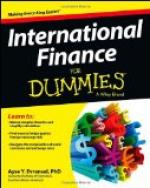There are thus many good reasons why it is the business of a careful issuing firm to see not only that any loan that it offers is well secured, but also that it is to be spent on objects that will not impair the productive capacity of the borrowing country by leading it down the path of extravagance, but will improve it by developing its resources or increasing its power to move its products. On the other hand, the temptation to undertake bad business on behalf of an importunate borrower is great. The profits are considerable for the issuing house and for all their followers in the City. The indirect advantages, in the way of trade orders, conferred on the lending country, are also profitable, and there is always the fear that if London firms take too austere a view of what is good business for them and the borrowing countries, the more accommodating loan-mongers of foreign centres may reap the benefit, and leave them with empty pockets and the somewhat chilly comfort conferred by the consciousness of a high ideal in finance.
One of the most unsatisfactory features about the monetary arrangements of society, as at present constituted, is the fact that the reward of effort is so often greater with every degree of evil involved by the effort. And to some extent this is true in finance. Just as big fortunes are made by the cheap-jacks who stuff the stomachs of an ignorant public with patent medicines, while doctors slave patiently for a pittance on the unsavoury task of keeping overfed people in health; just as Milton got L5 for “Paradise Lost,” while certain modern novelists are rewarded with thousands of pounds for writing romances which would never be printed in a really educated community; so in finance the more questionable—up to a certain point—be the security to be handled, the greater are the profits of the issuing house, the larger the commissions of the underwriters and brokers, and the larger are the amounts paid to the newspapers for advertising. As has already been observed, that part of the City that lives on handling new issues has been half starved since the war began, because its activities have been practically confined to loans issued by the British Government. These loans have been huge in amount but there has been no underwriting, and brokerages are cut to the bone. Advertising for the second War Loan was on a great scale, but in proportion to the amount subscribed the cost of it was probably small, according to the ideals that ruled before the war. A Colonial loan, or a first-class American railroad bond, almost places itself, and the profits on the issue to all who handle it are proportionately low. The more questionable the security, the more it has to pay for its footing, and the higher are the profits of those who father it and assist the process of delivery, as long, that is, as the birth is successfully accomplished.




